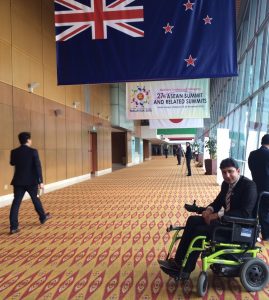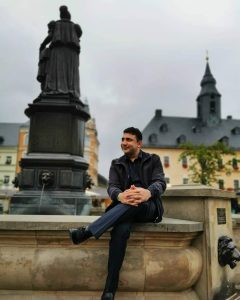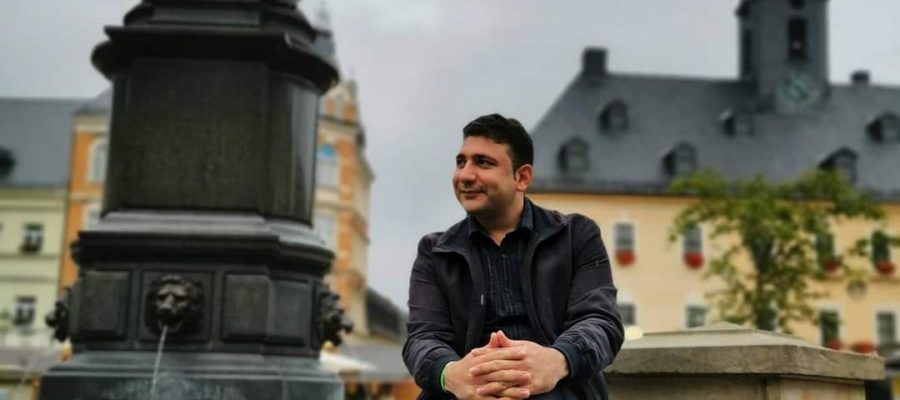Ali Ahmad Wali Zada (31) lives in Chemnitz, Germany and is a trained web engineer, volunteer translator and author. He was born in Herat, Afghanistan and lost both legs to a landmine during the war. Instead of despairing, he started to work all the more energetically for his success in school and university. His life as a refugee is nevertheless a permanent ordeal, partly because he still has no secure residence in Germany. In this text, he lets the reader share his innermost thoughts and describes the crushing burden of a life in residency limbo.
Close your eyes and imagine something for a moment: What if you were born in a place where bombings, shootings, and murders are as cheap as lies. If the value of your mother’s, father’s, daughter’s or son’s life was considered zero and nothing? Instead of Legos and dolls, your toys are the remains of bombs and leftover pieces of bullets that you can find scattered all over the floor. Instead of watching Cartoon Network or Looney Tunes, you go up to the roof to see the “fireworks” set off by an explosion somewhere in your neighborhood. Unaware that a school or a house where families lived was destroyed. Your still innocent mind could never have comprehended that people were killed every time you heard the sound of those “fireworks.”
In this chaos, you see people coming together, praying for the deceased and crying for the future of the living. Like any other child in the world, you continued to play with other children. Without knowing that a father and mother had just lost their child; a wife her husband; a daughter and son their father; a friend his friend; lovers their partner – and a country lost its peace. You are growing up in this never-ending cycle. It has become a routine for you. You spend your childhood having such ugly experiences, and you grow up without any idea of what the outside world is like. You believe that this is normality. Until one day you wake up in a hospital from a prolonged nightmare, with your vision still blurry. You see your family standing in front of you, reassuring you that everything will be okay.

You lie on the bed in the UN-funded hospital, which is built of wood. There are barely enough resources and technology to treat you, but still enough to keep people alive for some time. You scream loudly and ask the people in the room to stop pulling on your legs, but no one listens. That’s when you look down at your body and realize that half of it is gone. A few minutes ago, you were on your way to get bread for your family. The next moment, your life has changed forever. By a landmine that was never supposed to hurt children, women or civilians. In all the rubble, you now have to face every uncertainty for the rest of your life. You will never fully heal. You must spend the next 20 years of your life watching more and more of these “unfortunate accidents” happen to many more children and adults in your country.
At this moment, you’ve had enough. You have learned that there is a better future out there for you. You believe that everyone deserves a chance at a good life. At least better than the one you’re struggling with now. One day you take the leap and assure yourself you’ll never look back. You worked twice as hard just to get a chance that would have been given to you if you were born in another country. You never gave up. With all the sorrows you carry, you promised yourself a better future. Even if it meant leaving everything at home and missing your loved ones who couldn’t come with you. You go through all the uncertainties and overcome every obstacle, even the ones you never expected. You fought and fought until you reached your final destination.
After decades of suffering, you finally thought that this is the end of the hard time and now you will have a deserved peaceful life.
Now that you have arrived in another safe country, you have to adapt to a new culture. Learn a new language, adapt to new values, rules and norms. Basically, everything you’ve ever known has to be either changed, adapted, or maligned. After a while, you find yourself in an isolated space. Without a knowledge of what comes next; why you feel you don’t belong and depressed. You are afraid of the discrimination and racism you have faced from people who have never tried to understand you.

Yet you remain patient and unyielding, knowing that you cannot return to the place that destroyed you. You have swallowed all the abuse, the hatred, the insults, and all the missed opportunities. You wait for help from the government that preached human rights to itself. You have waited for years and in your loneliness you remember images from your childhood. You miss your loved ones, remember the violence you went through. And the many questions to which you have no answer: For example, whether or not you could have had a better life.
You pushed for an answer, hoping to get one and desperate to get on with your life. Instead, you’re told to stay patient -once too often. Because you waited 30 years and after everything you are told to just keep waiting. Now you’re back to square one, waiting anxiously to see if the efforts you’ve made will lead to a favorable future or back to where you saw the world collapse.
This is the reality of being a refugee.



